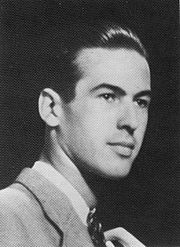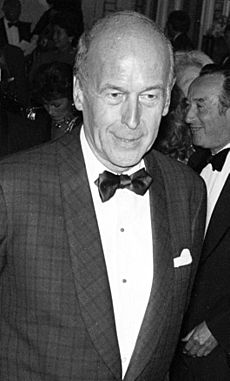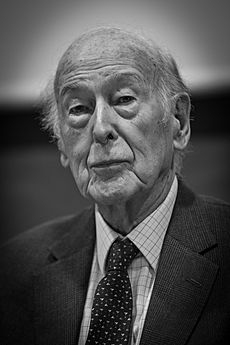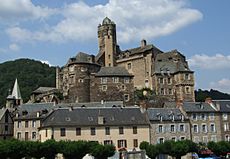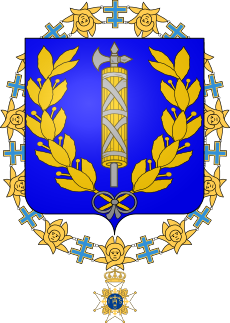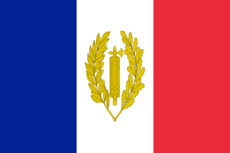Valéry Giscard d'Estaing facts for kids
Quick facts for kids
Valéry Giscard d'Estaing
|
|
|---|---|
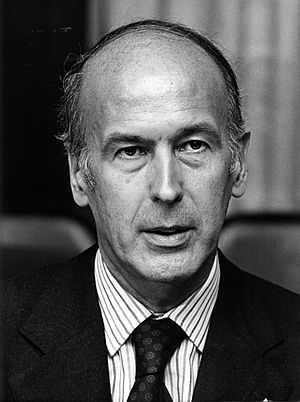
Giscard d'Estaing in 1975
|
|
| 20th President of France | |
| In office 27 May 1974 – 21 May 1981 |
|
| Prime Minister | |
| Preceded by | Georges Pompidou |
| Succeeded by | François Mitterrand |
| President of the Regional Council of Auvergne | |
| In office 21 March 1986 – 2 April 2004 |
|
| Preceded by | Maurice Pourchon |
| Succeeded by | Pierre-Joël Bonté |
| Minister of the Economy and Finance | |
| In office 20 June 1969 – 27 May 1974 |
|
| Prime Minister | |
| Preceded by | François-Xavier Ortoli |
| Succeeded by | Jean-Pierre Fourcade |
| In office 18 January 1962 – 8 January 1966 |
|
| Prime Minister |
|
| Preceded by | Wilfrid Baumgartner |
| Succeeded by | Michel Debré |
| Mayor of Chamalières | |
| In office 15 September 1967 – 19 May 1974 |
|
| Preceded by | Pierre Chatrousse |
| Succeeded by | Claude Wolff |
| Personal details | |
| Born |
Valéry René Marie Georges Giscard d'Estaing
2 February 1926 Koblenz, French-occupied Germany |
| Died | 2 December 2020 (aged 94) Authon, Loir-et-Cher, France |
| Resting place | Authon Cemetery, Authon |
| Political party | |
| Spouse | |
| Children | 4, including Henri and Louis |
| Alma mater | |
| Signature |  |
| Military service | |
| Allegiance | Free France |
| Branch/service | Free French Forces |
| Years of service | 1944–1945 |
| Rank | Brigadier-chef |
| Battles/wars |
|
| Awards | Croix de Guerre 1939–1945 |
Valéry Giscard d'Estaing (born 2 February 1926, died 2 December 2020) was a French politician. He served as the President of France from 1974 to 1981. People often called him Giscard or VGE.
Before becoming president, he was the Minister of Finance. He won the 1974 presidential election with 50.8% of the votes. During his time as president, he made many changes to modernize France. He supported big projects like the TGV high-speed train and increased the use of nuclear power. He also started projects for famous buildings like the Musée d'Orsay in Paris.
His presidency faced challenges due to a worldwide economic downturn. This period marked the end of the "Trente Glorieuses", which were 30 years of prosperity after World War II. He tried to control the economy with strict budgets. In 1981, he lost the election to François Mitterrand. As a former president, he continued to be involved in French and European politics. He was a strong supporter of cooperation among European countries. He passed away at the age of 94, becoming the longest-lived French president.
Early Life and Education
Valéry Giscard d'Estaing was born on 2 February 1926 in Koblenz, Germany. His father, Jean Giscard d'Estaing, was a high-ranking government official. His mother was Marthe Bardoux.
Valéry had an older sister, Sylvie, and three younger siblings. His family added "d'Estaing" to their name, but they were only distantly related to the old aristocratic d'Estaing family.
He went to several schools in France, including famous ones in Paris. During World War II, he joined the French Resistance. He helped protect an important leader during the Liberation of Paris. He then joined the French First Army and fought until the war ended. For his service, he received the Croix de guerre medal.
In 1948, he taught for a year in Montreal, Canada. He later graduated from two top French schools, the École Polytechnique and the École nationale d'administration. He was very good at finance and joined the government's financial inspection service. He could also speak German fluently.
Starting His Political Career
First Steps in Government: 1956–1962
In 1956, Giscard was elected to the National Assembly, which is like the French parliament. He represented the Puy-de-Dôme area, where his mother's family was from. He joined a conservative political group. When the Fifth Republic was formed, he became the Secretary of State for Finances from 1959 to 1962.
Working with the Gaullist Party: 1962–1974
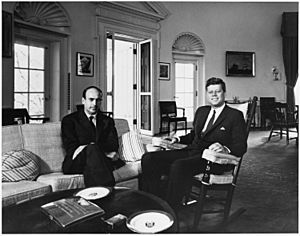
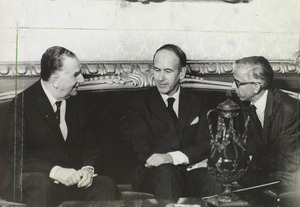
In 1962, Giscard became the Minister of Economy and Finance. His political party disagreed with the Gaullists, who were the main ruling party. But Giscard decided to stay in his role. He then created his own party, the Independent Republicans (RI). This party became a smaller partner to the Gaullists in the government.
He was removed from the cabinet in 1966. He then turned his party into the National Federation of the Independent Republicans (FNRI). He often disagreed with President Charles de Gaulle's policies, saying "yes, but...".
In 1969, President de Gaulle planned to resign if a public vote on a new constitution failed. Giscard encouraged people to vote "no". When the "no" vote won, de Gaulle resigned. Many Gaullists blamed Giscard for this outcome.
However, after Georges Pompidou became president in 1969, Giscard returned as Minister of Economy and Finance. He was seen as a new kind of politician, very skilled in government administration.
Becoming President of France
In 1974, after President Pompidou suddenly passed away, Giscard decided to run for president. His main opponents were François Mitterrand from the left and Jacques Chaban-Delmas, a former Gaullist prime minister.
Other Gaullist leaders supported Giscard, believing he was the best choice to defeat Mitterrand. In the first round of the election, Giscard came in second to Mitterrand but was ahead of Chaban-Delmas. In the final round on 20 May, Giscard won by a small margin, getting 50.7% of the votes.
President of France: 1974–1981
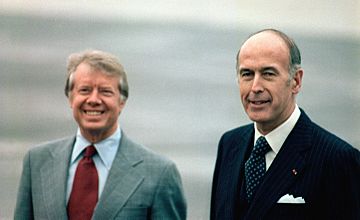
When Giscard became president in 1974, he was 48 years old. This made him one of the youngest presidents in French history at that time. He quickly started making changes. He appointed women to important government positions, like Simone Veil as Minister of Health.
Changes in France
Giscard wanted to modernize France. He increased the minimum wage and improved benefits for families and older people. He made it easier to get political asylum and expanded health insurance for everyone. He also lowered the voting age to 18 and updated divorce laws.
He pushed for the development of the TGV high-speed train network. He also supported Minitel, an early online service. He strongly promoted nuclear power to make France more energy independent. During his presidency, people's incomes generally increased.
His biggest challenge was a global economic crisis caused by rising oil prices. He appointed Raymond Barre as Prime Minister in 1976. Barre introduced strict economic plans to control inflation and support the economy.
Giscard tried to seem more approachable than past presidents. He rode the subway and had dinners with ordinary citizens. However, he later became more distant, and some critics said he was too far removed from everyday people.
He faced political competition from Jacques Chirac, who led the Gaullist party. This rivalry led Chirac to resign as Prime Minister in 1976. Giscard then formed his own center-right political group, the Union for French Democracy (UDF).
Working with Other Countries
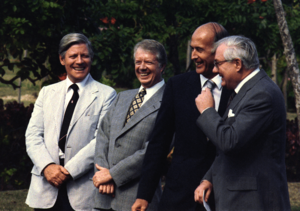
Valéry Giscard d'Estaing was a close friend of West German Chancellor Helmut Schmidt. Together, they encouraged European countries to hold regular meetings. They also helped create the European Monetary System, which aimed to stabilize European currencies.
In 1975, he invited leaders from major economic powers to a summit in Rambouillet. This meeting led to the formation of the Group of Six (now G7), a group of leading industrial nations.
France and Africa
Giscard continued France's policy of maintaining good relationships with African nations. Countries like Senegal, Ivory Coast, Gabon, and Cameroon were important allies. In 1977, he sent French fighter jets to help Mauritania against guerrillas.
His involvement with the leader of the Central African Republic, Jean-Bédel Bokassa, was controversial. Giscard was initially friendly with Bokassa. However, as Bokassa's government became unpopular, Giscard distanced himself. In 1979, French troops helped remove Bokassa from power. This action was debated, especially since the new leader, David Dacko, was Bokassa's cousin.
A political issue known as the "Diamonds Affair" also occurred. In 1973, while he was Finance Minister, Giscard received diamonds from Bokassa. This story became public during his presidency. Giscard stated he sold the diamonds and gave the money to charity. This event contributed to his loss in the 1981 election.
Relations with Russia
Giscard d'Estaing tried to act as a peacemaker during the Soviet–Afghan War. He met with Soviet leader Leonid Brezhnev in 1980. He hoped to arrange a partial withdrawal of Soviet forces from Afghanistan. However, his efforts did not succeed, and he faced criticism for his approach.
1981 Presidential Election
In the 1981 French presidential election, Giscard faced a tough challenge. His former Prime Minister, Jacques Chirac, also ran against him in the first round. Chirac finished third and did not strongly support Giscard in the final round.
Giscard lost to François Mitterrand by a small margin. He later blamed Chirac for his defeat. For many years, it was known that Giscard had a strong dislike for Chirac.
After the Presidency
Returning to Politics: 1984–2004
After losing the presidency, Giscard took a break from politics. In 1984, he was re-elected to the National Assembly. He also became the president of the regional council for Auvergne. He led the Council of European Municipalities and Regions from 1997 to 2004.
He also helped create the annual AEI World Forum with his friend Gerald Ford, a former US President. He worked with the Trilateral Commission, writing papers on international issues.
He hoped to become prime minister again but was not chosen. In the 1988 French presidential election, he did not publicly support either of the two right-wing candidates.
He led the UDF party from 1988 to 1996. In the 1995 French presidential election, he supported his old rival, Jacques Chirac, who won. That same year, Giscard narrowly lost an election for mayor of Clermont-Ferrand.
In 2000, he suggested reducing the presidential term from seven to five years. This change was later approved by a public vote. His son, Louis Giscard d'Estaing, was elected to his former seat in the National Assembly.
Later Years: 2004–2020
In 2003, Valéry Giscard d'Estaing became a member of the Académie française, a prestigious French institution.
After losing the regional elections in 2004, he decided to leave party politics. He took his seat on the Constitutional Council, a role for former presidents. Some people criticized his actions there, as he campaigned for the European Constitution.
In 2007, he supported Nicolas Sarkozy for president. He also supported the creation of a new centrist party in 2012. In 2013, he supported the introduction of same-sex marriage in France. A 2014 poll showed that 64% of French people thought he had been a good president. He was seen as honest and skilled, though sometimes distant.
On 21 January 2017, he became the oldest former president in French history.
Working for European Unity
Throughout his career, Giscard strongly supported more European integration within the European Economic Community (now the European Union).
From 1989 to 1993, Giscard was a member of the European Parliament. He also led a liberal political group there.
From 2001 to 2004, he led the Convention on the Future of Europe. This group drafted the European Constitution. Although French voters rejected the Constitution in 2005, Giscard continued to promote it in other EU countries.
In 2008, he wrote an article about the Lisbon Treaty. He warned against trying to get public approval for European changes without being fully open about them.
In 2008, he became the honorary president of the Atomium-EISMD. He launched the Permanent Platform of Atomium Culture in 2009. He believed that European intelligence could help define the identity of the European people.
Personal Life
The French media often called Giscard "VGE". He was also known as l'Ex (The Ex) when he was the only living former president.
On 17 December 1952, Giscard married Anne-Aymone Sauvage de Brantes. They had four children together.
The Estaing Castle
In 2005, Valéry and his brother bought the castle of Estaing. This castle had once belonged to a famous admiral from the d'Estaing family. The brothers bought it for its historical meaning, not to live in it. They said it was an act of supporting history. However, some newspapers questioned their reasons. The castle was later sold in 2008 and is now owned by the Valéry Giscard d'Estaing Foundation.
His 2009 Novel
Giscard wrote a romantic novel called The Princess and the President. It was published in France on 1 October 2009.
Illness and Passing
On 14 September 2020, Giscard d'Estaing was hospitalized in Paris for breathing problems. He was diagnosed with a lung infection. He was hospitalized again in November but was released a few days later.
Valéry Giscard d'Estaing passed away on 2 December 2020, at the age of 94. His family stated that his funeral would be private. He was buried on 5 December in Authon, with about forty people attending.
President Emmanuel Macron described Giscard d'Estaing as a "servant of the state" and a "politician of progress and freedom". Macron declared a national day of mourning for him on 9 December. Many leaders, including former presidents and European officials, praised his efforts to modernize France and strengthen the European Union.
His Legacy
Giscard d'Estaing is remembered as a leader who modernized France and worked to strengthen the European Union. He introduced many social reforms, such as lowering the voting age and allowing divorce by mutual agreement. He strongly supported new technologies, like the TGV high-speed rail network and nuclear power.
Despite his goals, he faced a major economic crisis during his term, mainly due to rising oil prices. In foreign policy, his close friendship with West German Chancellor Helmut Schmidt was notable. Together, they encouraged European countries to work more closely and created new organizations like the European Monetary System and the G-7.
In December 2022, his wife, Anne-Aymone Giscard d'Estaing, sold some of his art and furniture.
Awards and Recognition
French Honors
- Grand-croix (and former Grand Master) of the Legion of Honour
- Grand-croix (and former Grand Master) of the Ordre National du Mérite
- Croix de Guerre 1939–1945
European Honors
In 2003, he received the Charlemagne Prize from the German city of Aachen. He was also a Knight of Malta.
International Honors
Giscard d'Estaing received many honors from countries around the world, including:
- Grand Collar of the Order Al Khalifa (Bahrain)
- Grand Collar of the Order of the Southern Cross (Brazil)
- Knight of the Order of the Elephant (Denmark)
- Collar of the Order of the Nile (Egypt)
- Grand Cross of the Order of Merit of the Federal Republic of Germany (West Germany)
- Collar of the Order of Pahlavi (Iran)
- Knight Grand Cross of the Order of Merit of the Italian Republic (Italy)
- Knight of the Order of the Gold Lion of the House of Nassau (Luxembourg)
- Collar of the Order of Muhammad (Morocco)
- Knight of the Order of the Seraphim (Sweden)
- Honorary Knight Grand Cross of the Order of the Bath (United Kingdom)
- Bronze Star Medal (United States)
Other Awards
- Nansen Refugee Award, 1979.
Coat of Arms
Giscard d'Estaing was given a coat of arms by Queen Margrethe II of Denmark and King Carl XVI Gustav of Sweden when he received their countries' highest honors.
See also
 In Spanish: Valéry Giscard d'Estaing para niños
In Spanish: Valéry Giscard d'Estaing para niños
 | Claudette Colvin |
 | Myrlie Evers-Williams |
 | Alberta Odell Jones |


